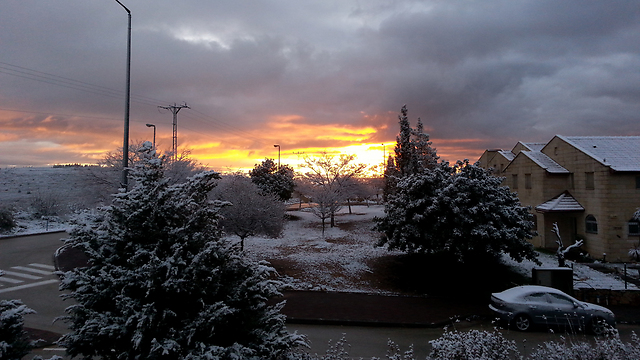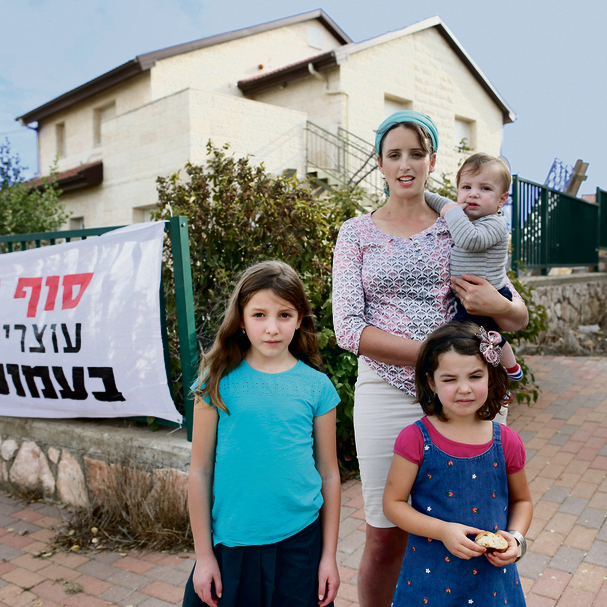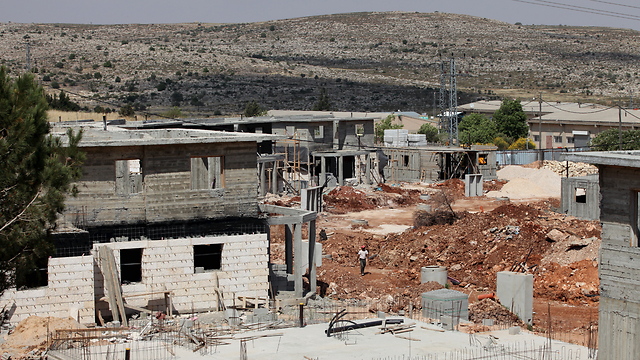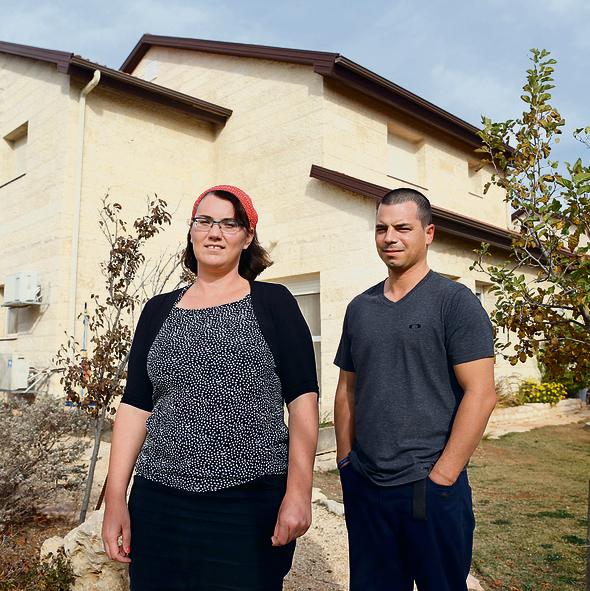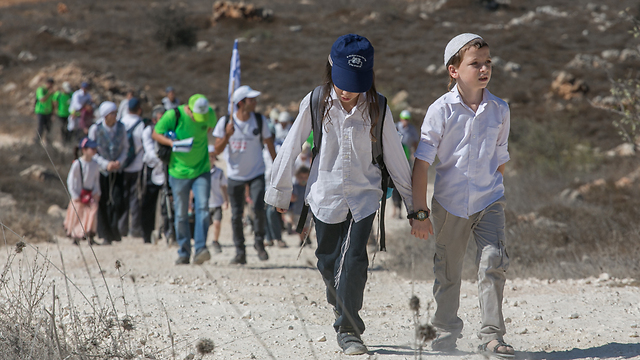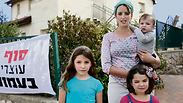
Ofra settlers optimistic despite odds
Just like their neighbors in Amona, nine families in the settlement of Ofra are facing home demolition. But unlike those in Amona, they're confident they can escape the bitter fate thanks to Donald Trump and the 'Regulation Bill.'
From the window of the Brot family home on Reuven Street in Ofra, the Amona outpost appears deeply rooted into the hill it was built on. Tile-roofed houses with trees planted in-between, and cars parked just outside. There is about a kilometer separating the hill that the High Court of Justice (HCJ) ordered to evacuate and the quiet street in this bourgeois settlement, where nine homes are also set for evacuation and demolition. The residents on the hill in Amona and their neighbors in the nine homes in Ofra can look at each other from afar, their hearts aching over their shared fate.
Legally, their story is almost the same. In both cases, the HCJ was asked to determine who owns the land and whether or not the construction on it was legal, and in both cases the court ordered to demolish the homes. While Amona is set for demolition in December 2016, the nine houses in Ofra will have to be evacuated by February 2017.
Last week, when we visited Ofra, we heard from the residents who were placing their hopes in Prime Minister Benjamin Netanyahu and the Bayit Yehudi ministers passing the "Regulation Bill" that would retroactively legalize their homes, sparing them from demolition. Two days later, after Donald Trump was elected president of the United States, they sounded far more optimistic. Now, they're hoping the momentum created across the Atlantic Ocean would embolden the government to pass the "Regulation Bill."
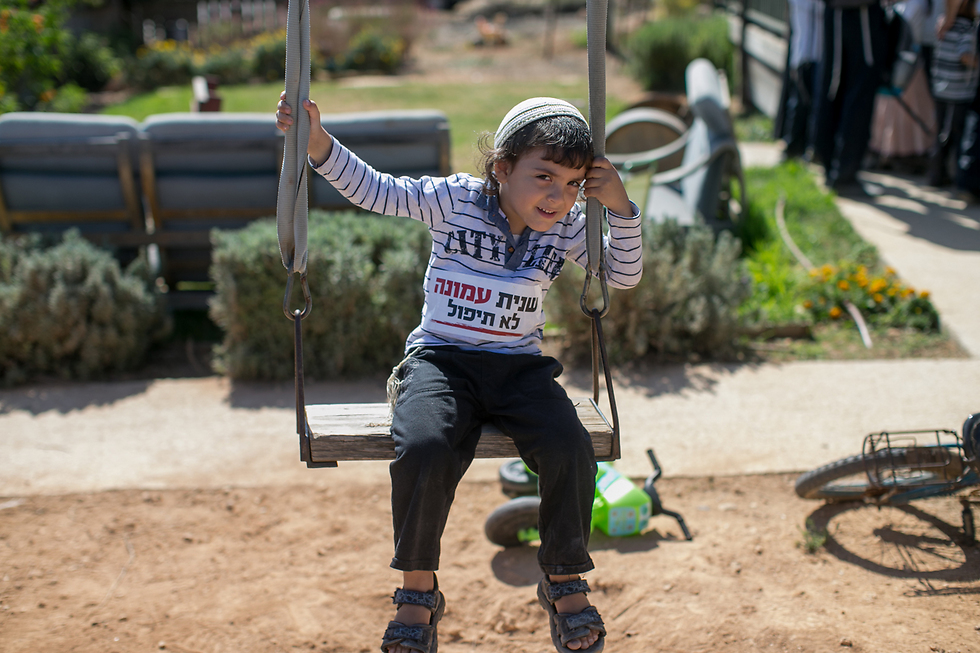
Earlier this week, the settlers from Amona and Ofra set up a protest tent outside the Prime Minister's Office in Jerusalem. Every day, another family from the nine house set for demolition will be protesting at the tent.
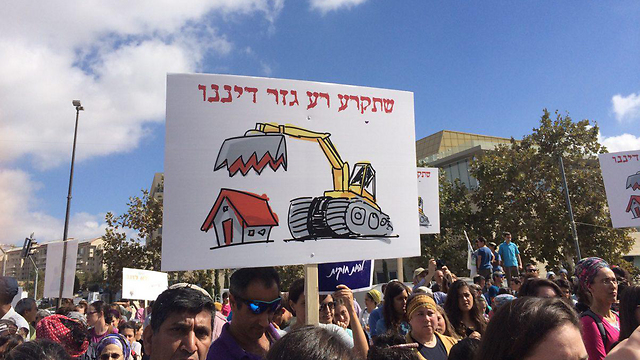
Shai Ben-Yosef, the chairman of the Ofra council, says the settlers planned to take advantage of the window of opportunity opened in the wake of the US election. "Until now, the explanation we got from the leaders in the government when we asked them why they weren't working to legalize the settlements in Judea and Samaria was that they could not implement the policy that got them elected because of pressure from the White House.
"Trump's victory eliminates this excuse of 'Oh no, what will they do to us?' The White House's next occupant is a man who has a lot less motivation to put pressure on Israel. We can reach understandings with him on legalizing the settlements. It was only two days before the elections that Trump said that Obama's Israel policy was problematic. That's why it's time for our government to drop the old excuses."
Building without a permit, but with a wink
But it's not just Trump's election and their political connections that give the Ofra settlers hope. Unlike Amona, the demolition of the nine houses in Ofra is a far more symbolic action. Just as Degania was to the Kibbutz Movement, so is Ofra to the West Bank settlement enterprise: The founding community, the first settlement, the keystone. Many other "Ofras" followed it, and the lessons learned in Ofra were copied, upgraded and perfected in other settlements: Arriving at night, quickly erecting some structures, not always with a permit in hand, but always with a wink from the authorities. The status of the land was determined as they went along—and sometimes not at all.
This is how it came to be that Ofra was largely built on disputed land, with its founders aware of it, but repressing the problem. Alas, just like any problem left unhandled, the land issue in Ofra eventually exploded.
The nine houses are located in the center of the Givat Zvi neighborhood, on the southwestern side of Ofra. In total, some 400 families live in the settlement, with most of the houses built on privately-owned land.
Esther Brot and her husband Netzah, both 31, got married 10 years ago. After a year in Jerusalem and another year in the settlement of Psagot, they decided to buy a house in Ofra.
"We were looking for a place that would be close enough to Jerusalem, and not too far from Tel Aviv," says Esther Brot, who works as an architect. "We wanted community life, good education, a middle-class place like Ofra. We didn't just come here because of ideology. There is mountain air here, lawns, intellectuals and thinkers, a supportive community.
"We contacted the community coordinator in the settlement to see if anyone was looking to sell, and she sent us to the secretariat. There, we were told they were in the process of building nine very high-standard houses. The houses were built on half a dunam each and cost NIS 830,000 ($216,000). The contractor was the settlement itself; it's not like a private contractor came here and did whatever he wanted. On paper, we've made an excellent deal. Today, a house like ours is valued at NIS 1.8 million ($468,000)—but without this 'stain' of a demolition order."
The couple bought one of the houses. Esther says that immediately upon closing the deal on the house, they went all out in designing the interior spaces.
"We went through all of the common steps," she says. "We have a building permit from the regional council and from the Settlement Division."
Didn't you know the status of the entire neighborhood was problematic?
"Absolutely not. It's safe to assume that had I known this was privately-owned land, I would not have bought (the house). None of the residents here knew. And it's not just the houses in this neighborhood. The entire settlement has 530 houses with the same status."
How did you find out?
"We've invested over half a million shekels on top of what we paid for the house in all sorts of renovations. We signed the contract for the house in January 2008, and in June a petition was filed against these houses to the High Court of Justice. By then we were heavily invested here. That day, June 5, a friend called us and said there was a High Court petition against houses in Ofra and asked if we heard anything about it. We didn't know what he was talking about. A quick inquiry found that our house was included in the petition. We were in shock. We realized we had invested our money in a dubious venture. But at that point we couldn't just walk away. We've had dreams for this house; we fell in love with it."
So how do you live for several years with the fear that one day the court will order that your house be demolished?
"It really is a feeling of great uncertainty. Back in 2008, when we bought the house, no one was thinking about being evacuated. We couldn't imagine the evacuation order would apply to a settlement like Ofra. Even later on, when people asked us why we didn't just leave, we said that after we've invested so much we couldn't just walk away. We were trying to resolve the problem. We were debating on whether to lay grass and ended up doing so because we chose to live without worrying about what's going to happen."
The HCJ petition against the nine houses in Ofra, which was filed by the non-profit Yesh Din – Volunteers for Human Rights, launched a race against the clock for the settlement. The houses were not yet ready for the families to move in, and the settlement's leadership was worried that the HCJ would issue an interim order to stop construction and bar the residents from moving in. Construction was therefore accelerated. In a rare move, Ofra's rabbi Avi Ginosar permitted construction to continue even on Shabbat.
The HCJ did issue an interim order two weeks later, but in that time several of the families have already moved in, creating facts on the ground.
Nati and Shira Perry, in their mid-30s, bought one of the nine houses after the HCJ petition was filed. Before buying the house, they spent five years living in a caravan outside Ofra, but Shira says they wanted a real home: "Four walls that can't get blown away by the wind."
They contacted the settlement's secretariat to inquire about houses for sale and were offered the houses in the new project.
"We were told there was some sort of a legal issue with the houses," Shira says, "but on the other hand, their status is no different than the other houses in Ofra. We thought it was a temporary problem, that it would work itself out."
"We were sure it would be fixed," Nati adds. "Something you could move past. We moved in with two children, and while living in the house we had two more. We invested in the garden—built a fish pool, planted flowers and trees. This isn't something you do in a temporary home. We really thought it was going to be okay."
The years went by, and the couple made the house their home. In the summer of 2014, Nati was called up for reserve duty during Operation Protective Edge in Gaza. In the fifth day of the ground operation, while lying in ambush on the outskirts of Khan Yunis, he was injured by a mortar shell that exploded near him. He spent nine months in a rehabilitation center and went back home with a 44 percent temporary disability rating.
The court ruling that determined the houses must be demolished was given on February 8, 2015. "That day, we returned from the hospital after Nati had undergone a successful operation. We were feeling euphoric because the operation was a significant milestone in his rehabilitation. I remember sitting on the couch in the living room when the neighbors came in with the news. It was a pretty difficult moment, a sort of shock. We felt helpless, thinking, 'Okay, what are we going to do now?' And it's not that we were completely oblivious; we knew there was an unresolved issue. But hey, we were living in an established settlement, the government is right-wing—so we wanted to believe things would work out.
"It's unbelievable to me. Nati went out in service of the country, risking life and limb to defend it, and all of a sudden he was being told, 'You can't stay in your home!' Does this make sense to you?"
The court determined your house was built on privately-owned land—that it's illegal.
"Then let them demolish the hundreds of illegal houses here. Who paved the road on the street outside the house? Who paved it if not the government? Who built the daycare three houses from us? Was it me and Nati or the government? And let's say the houses are demolished: What's going to be here instead? Will the Arabs who claim ownership over these plots come and farm these lands? Can they do anything with the land? No one will benefit from the demolition of my house and my neighbors' houses. No one."
Brot also makes a similar argument. "The houses will be demolished, and it would look like a wound in the heart of the settlement. It would be impossible to do anything with these plots. Not a park, not a field. Weeds will grow in the wreckage where my home used to be. That's what's going to happen here."
Shlomi Zacharia, a lawyer from Yesh Din, says these arguments are irrelevant. "The land owners, Palestinians from Ein Yabrud, can't get to their plots right now because they're located inside Ofra, which was mostly built on privately-owned land. The land owners might try to get to their plots—perhaps with an escort, and obviously in coordination (with the settlement)—but they can also decide not to get to their plots, leave the land as it is. It's their right to do as they see fit with their land."
Don't forget Obama
Following the peremptory ruling by the HCJ, the residents are wondering what to do next.
Esther Brot is not counting on Donald Trump. "We're hoping he stays true to his declarations on Israel, but you have to remember that Obama is still in the White House for the next couple of critical months, when the decision about the future of our homes will be made."
Ben Yosef, the head of the settlement's council, doesn't see the timing as an issue. "Let the Israeli government reach understandings with Trump and ask for a stay of execution from the HCJ regarding the houses in Ofra. When Trump enters the White House, we could pass the 'Regulation Bill.'"
Meanwhile, the Brots are looking for an alternative living solution for them and their three children—without much success so far. "We thought about moving to another street in Ofra," Esther says. "They have three empty lots there and I started planning a house for us on one of them. But then the state removed 45 dunams from Ofra's building zone, including those three plots. So we'll have to find another place."
Shira and Nati don't know where they are going to go either. "But one thing's for sure," Shira says, "we won't move to a house without having all of the permits. We won't do that again."
Their children are aware of the fact they are going to have to leave their home, which is set for demolition, but they don't understand why. "It's hard to explain land issues to children," Shira says, "but we speak to them openly about the situation. They know their home is going to be demolished. Our eldest, Carmel, asked this morning if they were going to demolish our wardrobes too or could we take them with us. There were also tears. We calmed the children down, promised them we would take everything with us, that we wouldn't leave anything here."










